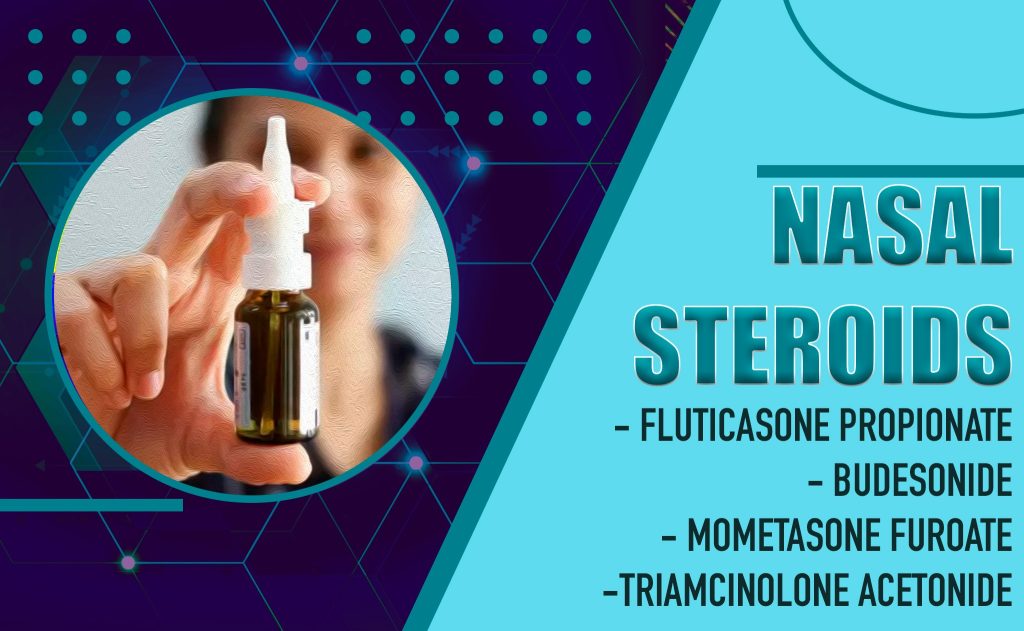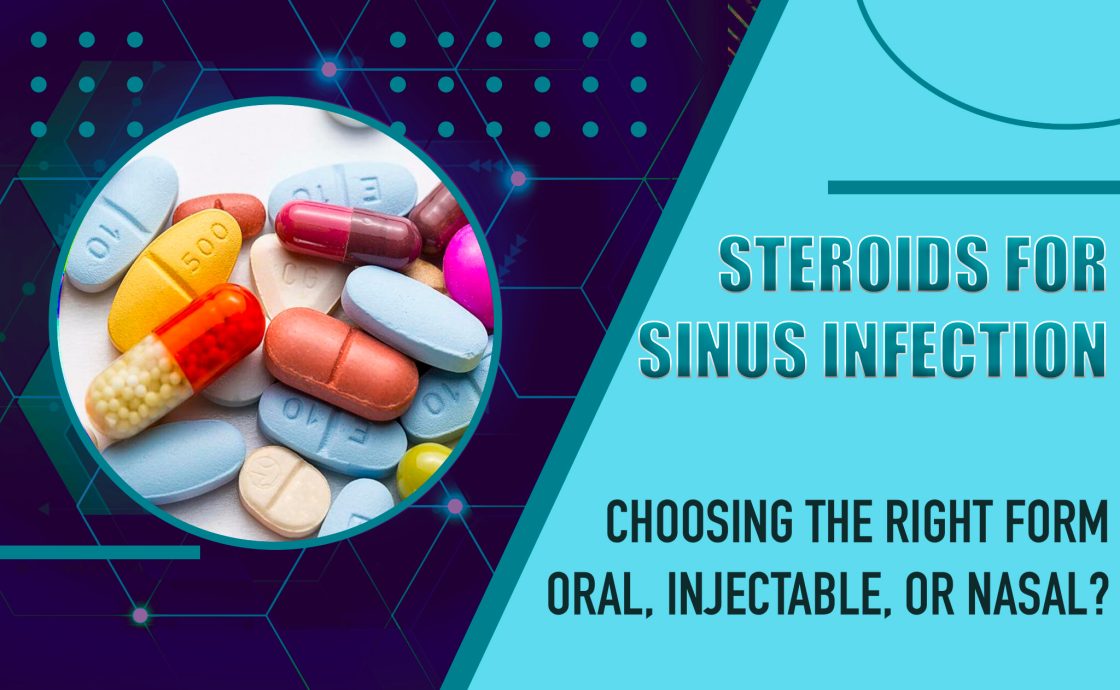Millions worldwide suffer from sinusitis, a prevalent condition characterized by sinus inflammation. This condition can cause facial pain, headaches, nasal congestion, and general discomfort, hampering day-to-day activities. While there are different treatments available, the use of steroids has gained attention due to their potential in reducing inflammation and mitigating symptoms quickly. Let’s find out the efficacy, considerations, and various aspects of using steroids to treat sinus infections, aiming to clarify this treatment option.
Understanding the Role of Steroids in Sinus Infection Treatment
Steroids, particularly corticosteroids, are powerful anti-inflammatory medications that treat many conditions, including sinus infections. Their primary role in treatment is to reduce the inflammation in the sinuses, which can alleviate symptoms like nasal congestion, pressure, and pain. However, it’s crucial to understand that while these medications can provide relief, they’re typically used as part of a broader treatment plan that may include antibiotics, decongestants, and saline irrigations.
Integration into Sinusitis Treatment Plans
While corticosteroids can effectively reduce inflammation, they are usually not prescribed as stand-alone treatments for sinus infections. Instead, they are part of a larger treatment regimen that includes several other components:
- Antibiotics: If a bacterial infection is diagnosed, antibiotics may be prescribed to eradicate the bacteria. While corticosteroids assist in reducing inflammation, antibiotics directly address the underlying infection, often the root cause of sinusitis.
- Decongestants: These medications relieve nasal congestion and open up the nasal passages, facilitating easier breathing. Decongestants reduce nasal swelling and improve airflow by narrowing blood vessels in the nasal mucosa.
- Saline Nasal Irrigation: This involves rinsing the nasal cavity with saline solutions to flush out mucus, allergens, and irritants. This can enhance nasal drainage and reduce the need for steroids and antibiotics.
The Debate on Effectiveness
The role of corticosteroids in managing sinus infections remains an active area of medical scrutiny and discussion. This contention stems from varied outcomes based on usage patterns, patient-specific factors, and the nature of sinusitis, be it acute or chronic.
Research Insights
A significant body of research underscores the value of corticosteroids in enhancing sinus infection treatment outcomes. Scientific studies have consistently shown that these medications can alleviate symptoms by reducing inflammation in the nasal passages and sinuses. This effect, in turn, promotes easier breathing, less facial pain, and a quicker return to daily activities, thereby lifting patients’ overall quality of life.
Scope of Benefits
- Immediate Symptom Relief: Corticosteroids are known for their rapid action in calming inflamed tissues. This makes them especially effective in acute episodes where swift symptom control is essential.
- Management of Chronic Conditions: Corticosteroids provide significant relief for those with chronic sinusitis, particularly those who have not responded well to antibiotics or nasal sprays. Their ability to penetrate the inflamed sinuses can reduce the likelihood of recurrence and help maintain an open nasal passage.
- Long-Term Quality of Life Enhancement: Beyond the immediate relief of symptoms, these medications have shown the potential to improve the long-term health status of individuals with recurrent sinus issues. They help reduce the cycles of inflammation and infection, thereby preventing complications and worsening the condition over time.
Factors Influencing Effectiveness
The effectiveness of corticosteroids can vary widely and depends on several factors:
- Patient Health Variabilities: Individual health conditions, such as autoimmune disorders or other chronic diseases, can influence how well these drugs work and how they are metabolized.
- Dosage and Administration: The type, dosage, and duration of corticosteroid treatment are critical in their effectiveness. Systemic forms of these drugs might work differently compared to localized treatments like nasal sprays.
- Compliance and Usage: Proper adherence to the prescribed regimen determines the success of corticosteroids in managing sinus infections. Incorrect use can lead to less-than-optimal results and potentially more side effects.
The Steroids Available for Sinus Infection Relief
Different steroids offer distinct therapeutic benefits and modes of administration. The choice of steroid and treatment regimen is typically grounded in the nature and severity of the sinus infection.
Oral Steroids
Oral corticosteroids are pivotal in managing acute and chronic sinus infections by reducing inflammation in the sinus tissues. Let’s explore the specifics of Prednisone, Methylprednisolone, and Dexamethasone in this context, focusing on dosages, duration of use, and targeted treatment objectives.
- Prednisone: It is frequently the go-to for its potent anti-inflammatory capabilities. Typically, it’s administered in a “burst” strategy for sinus infection treatment: a high dose initially, followed by a rapidly tapering dose to prevent rebound inflammation. For adults, the course might start with 40-60 mg daily for a few days, then taper down over the next 5-7 days. This short course aims to quickly reduce sinus swelling and relieve symptoms without incurring the longer-term side effects associated with prolonged steroid use. It’s beneficial in cases where nasal congestion and swelling are severe.
- Methylprednisolone: It is usually available in a dose pack that outlines a specific course of therapy, simplifying the tapering schedule. Medrol Dosepak typically includes a starting dose of 24 mg on the first day, which decreases gradually over 6 days. This structured approach helps manage acute symptoms while minimizing the risks of side effects from sudden dosage changes. Given its straightforward regimen, it’s especially beneficial for patients requiring a clear, easy-to-follow medication schedule.
Dexamethasone: It is known for its longer-acting properties and is sometimes preferred for its significant potency per dose, allowing lower quantities to achieve the desired anti-inflammatory effect. For sinus infection relief, it might be used in more severe cases or when other treatments haven’t sufficed. A typical regimen may involve a lower daily dose, around 4-6 mg per day, given its higher potency, with a duration not typically extending beyond a week to avoid side effects. This strategy can significantly alleviate symptoms in particularly stubborn cases of sinusitis.

Nasal Steroids
Nasal corticosteroids are delivered directly into the nasal passages, providing targeted relief with minimal absorption into the bloodstream. This local application decreases the possibility of systemic side effects from oral corticosteroids. Here, we’ll discuss the nuances of four commonly prescribed intranasal corticosteroids:
- Fluticasone Propionate (Flonase): Marketed as Flonase, it is designed for daily use with dosing typically starting at one or two sprays in each nostril once daily. Each spray delivers 50 micrograms of the medication. To manage an active sinus infection, a starting regimen of two sprays per nostril once daily may be recommended, lowering to one spray per nostril after symptoms improve. Long-term use is generally safe for ongoing management of chronic sinus infections, as the medication’s localized effect limits systemic exposure.
- Budesonide (Rhinocort): Found in Rhinocort, is another nasal spray used for relieving sinus inflammation. Patients usually administer one or two sprays into each nostril every morning, containing 32 micrograms of Budesonide. Dosing may vary based on the doctor’s recommendations and patient response. Given its safety profile, Budesonide can be considered for long-term use in chronic sinusitis. Dosage adjustments are made based on symptom control, leaning towards the minimal effective dose for maintenance.
- Mometasone Furoate (Nasonex): The brand name is Nasonex, and it is often prescribed with a dosing schedule starting at two sprays in each nostril once a day. With each spray containing 50 micrograms, the total daily dose initially reaches 200 micrograms. Once symptom control is achieved, the dosage may be decreased to one spray in each nostril daily for maintenance. Mometasone has a high receptor affinity, providing efficacy with lower doses, and its safety profile supports use over extended periods for chronic conditions.
- Triamcinolone Acetonide (Nasacort): It is marketed as Nasacort and is formulated for once-daily application. The usual starting dose may be one or two sprays in each nostril daily, with each spray delivering 55 micrograms of the medication. As with the other nasal corticosteroids, physicians often recommend decreasing to the lowest effective dosage once control is attained, potentially reaching one spray per nostril each day for maintenance therapy.
Injectable Steroids
In some clinical scenarios, injectable options might be chosen when oral corticosteroids are unsuitable due to contraindications or lack of efficacy. These powerful medications can provide rapid relief from inflammation due to their direct and potent effects. Below is a detailed discussion of three frequently used injectable corticosteroids:
- Kenalog (Triamcinolone Acetonide): It is a versatile corticosteroid used for various inflammatory conditions, including severe sinus infections. For sinusitis, an injection might be administered intramuscularly, allowing the medication to work systemically.A typical dosage would be around 40 mg; however, it can vary based on the patient’s overall health and the intensity of their symptoms. The effects can last for several weeks, and the injections are generally limited to a few times per year to avoid side effects such as tissue atrophy or hormonal imbalance.
- Depo-Medrol (Methylprednisolone Acetate): It is another injectable steroid that can be used to treat sinus infections when immediate and potent intervention is required. Similar to Kenalog, it is administered intramuscularly. Adults with sinusitis may often take 40 to 120 mg of medication, depending on their unique needs and the severity of their illness. The onset of action is relatively quick, and its effect can last about two to three weeks, providing extended relief from symptoms.
- Celestone (Betamethasone): It is commonly considered when a highly potent anti-inflammatory action is needed. For sinusitis, this medication might be injected once into the muscle in a dosage range from 6 mg to 12 mg. Due to its higher potency, the amount administered is generally lower than that of other steroids like Kenalog and Depo-Medrol. The beneficial effects from a single injection can be significant and lasting, which makes it suitable for acute exacerbations of chronic sinusitis where rapid reduction of inflammation is crucial.
Clinical Indications for Steroid Use in Sinus Infections
Considering steroids for sinus infection treatment, indications for their use should align with clinical guidelines and physician recommendations.
When Severe Symptoms Demand Swift Intervention
- Notable persistent congestion and facial pain despite standard treatments
- Recurrent sinus infections are not amenable to other forms of therapy
- The presence of nasal polyps complicates the infection
Steroids may be prescribed to provide immediate symptomatic relief and to curb the cycle of inflammation and infection.
As an Adjunctive Therapy Post-Sinus Surgery
- To minimize postoperative inflammation and promote healing
- In the management of chronic rhinosinusitis, to prevent recurrence
Post-sinus surgery, steroids can play a role in enhancing recovery outcomes and preventing further complications.
Interactions and Contraindications to Consider
Exploring the treatment for sinus infections necessitates a detailed understanding of potential interactions and contraindications tied to corticosteroid use. These powerful anti-inflammatory agents are complex, especially when considering other medications or underlying health conditions that might influence their safety and efficacy.
Potential Drug Interactions
- Impact on Blood Sugar Levels: Individuals taking medications for diabetes should exercise caution, as corticosteroids can elevate blood sugar levels. This adjustment might require close monitoring and potential modification of diabetic treatment regimens to maintain optimal glycemic control.
- Enhanced Effects of Blood Thinners: For those on anticoagulant therapy such as warfarin, corticosteroids may amplify the risk of bleeding. This interaction requires a possible adaptation of anticoagulant dosage to mitigate increased bleeding risks.
- Interaction with Live Vaccines: Corticosteroids’ immunosuppressive effect can diminish the efficacy of live vaccines. The timing of administering these treatments and vaccination should be carefully planned.
- Concurrent Use with NSAIDs: Non-steroidal anti-inflammatory drugs (NSAIDs) taken in conjunction with corticosteroids might raise the risk of gastrointestinal issues, including ulcers. Protective measures or alternative pain management strategies may be necessary.
Contraindications Based on Health Conditions
- Uncontrolled Diabetes: The propensity of corticosteroids to raise blood sugar levels poses a significant risk to individuals with uncontrolled diabetes, necessitating alternative sinus infection management strategies.
- Pre-existing Glaucoma: Those diagnosed with glaucoma face potential worsening of their condition due to increased intraocular pressure from corticosteroid use. This scenario demands a reassessment of treatment options.
- Hypertension: Elevated blood pressure can worsen with corticosteroid therapy, requiring individuals with hypertension to monitor their condition closely or consider different treatments.
- Psychiatric Disorders: Corticosteroids may influence mood and behavior, making it critical for individuals with psychiatric disorders to consult thoroughly before beginning treatment to avoid exacerbating their condition.
Balancing Efficacy and Safety in Steroid Use for Sinus Infections
Including steroids for sinus infections offers a robust approach to a well-rounded treatment plan. Their rapid action to diminish inflammation and relieve symptoms can significantly enhance comfort and hasten recovery for sinusitis sufferers. Embracing caution and awareness of potential side effects and medication interactions enriches the decision-making process to employ steroids. Meticulous management, underscored by a cooperative effort with medical consultants ensures that steroids are a beneficial ally in the fight against sinus infections, contributing to the wellness and improved quality of life for numerous patients.




Veriko – Секретный Код скачать песню и слушать онлайн
https://allmp3.pro/3348-veriko-sekretnyj-kod.html
Артем Качер – Одинокая Луна (Vincent & Diaz Remix) скачать песню и слушать онлайн
https://allmp3.pro/3040-artem-kacher-odinokaja-luna-vincent-diaz-remix.html
ANik feat. Ignat Izotov – Больше Никогда скачать песню и слушать онлайн
https://allmp3.pro/3254-anik-feat-ignat-izotov-bolshe-nikogda.html
Ольга Стельмах – Другая скачать песню и слушать онлайн
https://allmp3.pro/3301-olga-stelmah-drugaja.html
Александр Барыкин – Натали скачать песню и слушать онлайн
https://allmp3.pro/2461-aleksandr-barykin-natali.html
Миа Бойка feat. T-Killah – Лепесток скачать песню и слушать онлайн
https://allmp3.pro/2537-mia-bojka-feat-t-killah-lepestok.html
Ласковая Лилия feat. ШкольниК & Бау & NEMIGA – Карамель скачать песню и слушать онлайн
https://allmp3.pro/2680-laskovaja-lilija-feat-shkolnik-bau-nemiga-karamel.html
ДжаЯмми – На Рейве Цветы скачать песню и слушать онлайн
https://allmp3.pro/2805-dzhajammi-na-rejve-cvety.html
Esmi – Москва скачать песню и слушать онлайн
https://allmp3.pro/2920-esmi-moskva.html
https://honda-fit.ru/forums/index.php?autocom=gallery&req=si&img=7321
Shoo – Около скачать песню в mp3 и слушать онлайн https://shorturl.fm/82vM7
Aksel’ – Свободна скачать бесплатно mp3 и слушать онлайн https://shorturl.fm/5dEzh
http://terios2.ru/forums/index.php?autocom=gallery&req=si&img=4547
Елена Темникова – Не модные скачать песню и слушать онлайн https://shorturl.fm/8ga6Y
Inima Feat. & Батишта – Принимай скачать mp3 и слушать онлайн бесплатно https://shorturl.fm/AW0FW
Alib – Холодные Слова скачать песню в mp3 и слушать онлайн https://shorturl.fm/hBxPZ
Воскресенский – Цель скачать mp3 и слушать онлайн бесплатно https://shorturl.fm/XHvW0
https://vitz.ru/forums/index.php?autocom=gallery&req=si&img=5004
https://hrv-club.ru/forums/index.php?autocom=gallery&req=si&img=7071
Мечтать – Тук тук (DJ Vini & Onik Remix) скачать и слушать песню бесплатно https://shorturl.fm/8gUfA
https://myteana.ru/forums/index.php?autocom=gallery&req=si&img=6714
http://toyota-porte.ru/forums/index.php?autocom=gallery&req=si&img=3322
http://wish-club.ru/forums/index.php?autocom=gallery&req=si&img=5306
https://mazda-demio.ru/forums/index.php?autocom=gallery&req=si&img=6633
Жуки – Я не могу тебя не любить (Nejtrino & Baur Radio Mix) скачать песню бесплатно в mp3 и слушать онлайн https://shorturl.fm/UEu2x
http://toyota-porte.ru/forums/index.php?autocom=gallery&req=si&img=3355
https://myteana.ru/forums/index.php?autocom=gallery&req=si&img=6813
http://toyota-porte.ru/forums/index.php?autocom=gallery&req=si&img=3339
https://myteana.ru/forums/index.php?autocom=gallery&req=si&img=6784
https://vitz.ru/forums/index.php?autocom=gallery&req=si&img=4967
https://mazda-demio.ru/forums/index.php?autocom=gallery&req=si&img=6472
https://hrv-club.ru/forums/index.php?autocom=gallery&req=si&img=7035
https://myteana.ru/forums/index.php?autocom=gallery&req=si&img=6707
http://terios2.ru/forums/index.php?autocom=gallery&req=si&img=4658
Потап и Настя – Не люби мне мозги скачать песню бесплатно в mp3 и слушать онлайн https://shorturl.fm/hP313
TERNOVOY feat. AMCHI – Прочь скачать и слушать песню https://shorturl.fm/qglH1
Кирилл Скрипник – Где Ты скачать mp3 и слушать онлайн бесплатно https://shorturl.fm/HIoNN
Dj Smash – БЕГИ feat. Poët скачать и слушать песню https://shorturl.fm/GxANs
Макс Корж – 2 Типа Людей скачать песню и слушать онлайн https://shorturl.fm/dWGxY
Звонкий – Shine скачать mp3 и слушать онлайн https://shorturl.fm/MCnar
Андрей Корнеев – Семья скачать mp3 и слушать онлайн https://shorturl.fm/uMWuR
ChipaChip & Макси АК – Моя земля скачать песню и слушать бесплатно https://shorturl.fm/SaTLS
http://wish-club.ru/forums/index.php?autocom=gallery&req=si&img=5239
https://hrv-club.ru/forums/index.php?autocom=gallery&req=si&img=6893
http://terios2.ru/forums/index.php?autocom=gallery&req=si&img=4856
http://terios2.ru/forums/index.php?autocom=gallery&req=si&img=4851
https://honda-fit.ru/forums/index.php?autocom=gallery&req=si&img=7124
https://vitz.ru/forums/index.php?autocom=gallery&req=si&img=4891
https://mazda-demio.ru/forums/index.php?autocom=gallery&req=si&img=6421
https://honda-fit.ru/forums/index.php?autocom=gallery&req=si&img=7121
https://myteana.ru/forums/index.php?autocom=gallery&req=si&img=6699
https://hrv-club.ru/forums/index.php?autocom=gallery&req=si&img=6968
https://hrv-club.ru/forums/index.php?autocom=gallery&req=si&img=6993
https://honda-fit.ru/forums/index.php?autocom=gallery&req=si&img=7147
This piece is a beautiful blend of wisdom and simplicity — it makes you think deeply while keeping things accessible.
https://honda-fit.ru/forums/index.php?autocom=gallery&req=si&img=7280
https://mazda-demio.ru/forums/index.php?autocom=gallery&req=si&img=6584
https://myteana.ru/forums/index.php?autocom=gallery&req=si&img=6745
http://wish-club.ru/forums/index.php?autocom=gallery&req=si&img=5410
https://hrv-club.ru/forums/index.php?autocom=gallery&req=si&img=6910
http://wish-club.ru/forums/index.php?autocom=gallery&req=si&img=5242